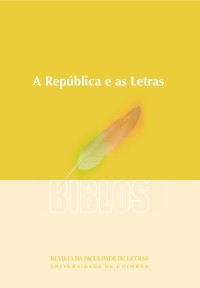Please use this identifier to cite or link to this item:
https://hdl.handle.net/10316.2/32605| DC Field | Value | Language |
|---|---|---|
| dc.contributor.author | Pereira, José Carlos Seabra | - |
| dc.date.accessioned | 2014-07-03T14:59:09Z | |
| dc.date.accessioned | 2020-09-18T09:09:55Z | - |
| dc.date.available | 2014-07-03T14:59:09Z | |
| dc.date.available | 2020-09-18T09:09:55Z | - |
| dc.date.issued | 2010 | - |
| dc.identifier.issn | 0870-4112 | - |
| dc.identifier.uri | https://hdl.handle.net/10316.2/32605 | - |
| dc.description.abstract | In the Republican period between the Camões Tricentennial and the establishment of the New State, Portuguese literature was dominated by successive waves of interventionist art which oscillated in ideological terms between nationalism and Franciscanism and in aesthetic terms between expressiveness and didacticism. Early 20th century critics and writers who were part of a vitalist and emancipatory current adopted the designation “literature of intents” to emphasize the ethical and social mission of their aesthetic-ideological program. Their art was engaged in the struggle of ideas and in political movements that were “progressive” (Republican and Masonic, and in some cases also socialist or anarchistic). This literary current achieved a position of dominance in the fi rst decade of the 20th century, and gave an important contribution to the advent of the Republic. In the early years of the Republic, it lost some ground to another neo-romantic movement, which also included Republican writers, although engaged in a different “literature of intents”. This was the nostalgic movement, whose oracular and prophetic discourse aimed at promoting a Portuguese messianism that would lead Humanity to the universal utopia of the new Indies of Justice, Beauty and Love. After the beginning of the Great War, the dynamics of the Portuguese literary fi eld changed, with the emergence of the First Modernism and of artistic vanguards (whose intents were quite different). A new neo-romantic current began to assert itself – it was also a “literature of intents” but on the opposite side of the trenches (traditionalist, counter-revolutionary, Catholic and neo-monarchical). At the end of the First Republic there was still room for certain metamorphoses of the progressive “literature of intents”, especially around the journal Seara Nova. | eng |
| dc.description.abstract | Desde o Tricentenário de Camões até ao Estado Novo, o tempo republicano da literatura portuguesa é dominado por sucessivas vagas de arte interventiva, por entre variações ideológicas de nacionalismo ou de franciscanismo e riscos estéticos de ênfase expressiva ou de didactismo. Críticos e escritores do início do século XX, integrados numa corrente vitalista e emancipalista, assumem a designação «literatura de intuitos» para distinguir o programa estético-ideológico a que obedecia a sua arte de actualidade e de intervenção, com uma missão ética e social, comprometida no combate de ideias e nas movimentações políticas - em nome de opções “progressistas” (republicanas e maçónicas, por vezes também socialistas ou anarquistas).Tendo conseguido tornar- -se dominante na primeira década do século XX, essa corrente literária deu inegável contributo para o advento da República. Nos primeiros anos da República, cedeu posições em favor doutra corrente – também neo-romântica, também maioritariamente de autores republicanos, mas cultivando diferente «literatura de intuitos». Trata-se do movimento saudosista, cujo discurso oracular e profético ambiciona promover um messianismo lusíada de condução da Humanidade à utopia universal das novas Índias da Justiça, da Beleza e do Amor. Com o advento da Grande Guerra, altera-se a dinâmica do campo literário português, onde se dá a erupção do Primeiro Modernismo e de manifestações de Vanguardas artísticas (cujos intuitos eram bem outros!...). Começa então a impor-se nova dominante neo-romântica – também de «literatura de intuitos», mas agora em trincheira adversária (tradicionalista, contra-revolucionária, católica, neo-monárquica). No ocaso da I República, há ainda espaço conjuntural para certas metamorfoses de progressista «literatura de intuitos», especialmente em torno da Seara Nova. | por |
| dc.language.iso | por | - |
| dc.publisher | Faculdade de Letras da Universidade de Coimbra | - |
| dc.subject | intervention | eng |
| dc.subject | emancipation | eng |
| dc.subject | nationalism | eng |
| dc.subject | Franciscanism | eng |
| dc.subject | social utopia | eng |
| dc.subject | Neo-Romanticism | eng |
| dc.subject | intervenção | por |
| dc.subject | emancipação | por |
| dc.subject | nacionalismo | por |
| dc.subject | franciscanismo | por |
| dc.subject | utopia social | por |
| dc.subject | Neo-Romantismo | por |
| dc.title | Literatura de intuitos no tempo republicano | por |
| dc.title.alternative | The literatura of intents during republican times | eng |
| dc.type | article | - |
| uc.publication.collection | Biblos vol. VIII | - |
| uc.publication.firstPage | 337 | - |
| uc.publication.lastPage | 418 | - |
| uc.publication.location | Coimbra | - |
| uc.publication.journalTitle | Biblos | - |
| uc.publication.volume | 8 | por |
| uc.publication.section | Artigos | - |
| uc.publication.digCollection | IP | - |
| uc.publication.digCollection | B1 | - |
| uc.publication.orderno | 14 | - |
| uc.publication.area | Artes e Humanidades | - |
| uc.publication.manifest | https://dl.uc.pt/json/iiif/10316.2/32605/218122/manifest?manifest=/json/iiif/10316.2/32605/218122/manifest | - |
| uc.publication.thumbnail | https://dl.uc.pt/retrieve/11289828 | - |
| uc.itemId | 71749 | - |
| uc.thumbnail.uri | https://dl.uc.pt/iiif-imgsrv/11289662/dl!3!61!74!19!61741964367180327278572771411672440124 | - |
| item.grantfulltext | open | - |
| item.fulltext | With Fulltext | - |
| Appears in Collections: | Biblos | |
Files in This Item:
| File | Description | Size | Format | |
|---|---|---|---|---|
| biblosviii_artigo14.pdf | 3 MB | Adobe PDF |  |
Items in DSpace are protected by copyright, with all rights reserved, unless otherwise indicated.
